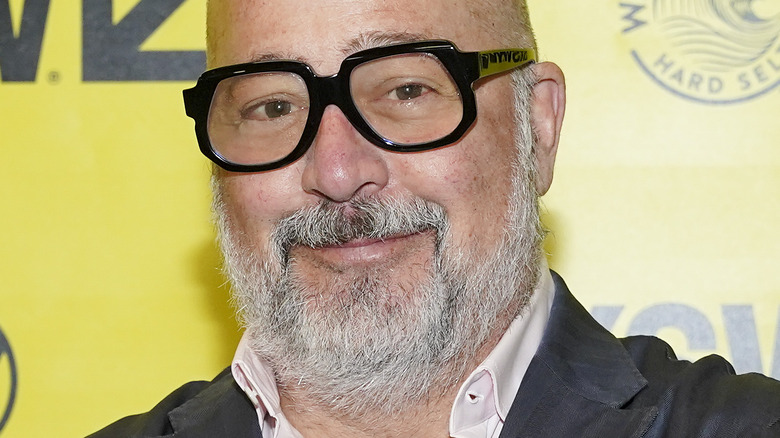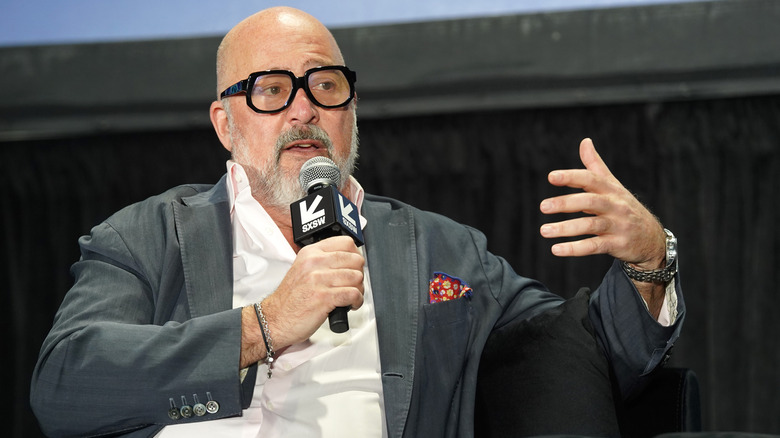The Reason Andrew Zimmern Thinks Tipping Should Be Eliminated
Tipping is an integral part of dining out in America. Customers are expected to add gratuity to their check for servers and bartenders, which more often than not makes up most of said employee's wage. The federal minimum wage for servers is $2.13 rather than the national minimum wage of $7.25, per the Department of Labor, as it's expected that the difference will be made up by tips given by customers.
But while tipping culture is the norm in America, it's not as common in other parts of the world. In Europe, tipping is seen as a reward for good service that will always be appreciated, even though it's not necessary, per Rick Steves.
While one can easily chalk this up to simple cultural differences and not give it a second thought, there are plenty of people who oppose the current American system, including celebrity chef Andrew Zimmern. This opposition becomes even more understandable when one begins to learn about the history of tipping in America.
Should tipping be elminated?
Andrew Zimmern is just one person opposed to America's current tipping system. In his Substack newsletter, Spilled Milk, the chef answered a question about whether or not he supports the current system of tipping at restaurants. In response to the question, the chef openly stated that he believes it should be abolished. However, he also acknowledges that simply eliminating tipping wouldn't fix the issues in the hospitality industry, as minimum wages and menu prices would have to be raised to account for the difference.
Often, people who argue in favor of keeping the tipping system in place claim tipping is necessary to motivate servers, according to a 2018 Time report. But that's not always the case; in 2013, restaurateur Jay Porter wrote an article for Slate detailing how his restaurant improved after introducing a static service charge rather than accepting tips. The move improved the restaurant's food and service and ended up making more money for both front-of-house and back-of-house workers. Similarly, a paper published by Michael Lynn at Cornell University found little correlation between a diner's perceived service experience and the amount they tipped.
In his Spilled Milk post, Zimmern points out that culturally, American consumers might not be ready to pay the cost increases that ending tipping would require. He also posits that the current system isn't just unsustainable but also prioritizes the needs of the guest over those of the employees, requiring a collective effort to change from the industry as a whole.
The origins of American tipping
Tipping hasn't always been a part of dining out in American restaurants. In a 2016 interview with The Washington Post, author Saru Jayaraman explained that the practice was first instigated by wealthy Americans who traveled abroad and learned about European customs of tipping, then returned home and attempted to appear cultured by tipping themselves in the 1850s and 1860s.
In Europe, tipping originates from the feudal system, when nobles would give extra payment to servants whom they deemed excellent workers, according to Time. While tipping would eventually fall out of favor in Europe, the system still holds strong in America — in part due to an undeniable connection to slavery. At the end of the Civil War, former slaves found work primarily in food industry positions that relied on tips for wages. Many employers would take advantage of the tipping system to avoid paying them a proper wage, relying on their guests to do so, according to USA Today.
Even today, the system is deeply flawed. Jayaraman told the Post that "there's a $4 per hour wage gap between what white workers and workers of color make in the restaurant industry." Andrew Zimmern isn't alone in wanting to abolish the practice of tipping, but whether or not this change will come to pass remains to be seen.


